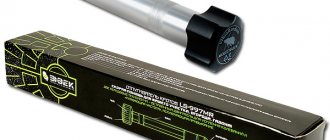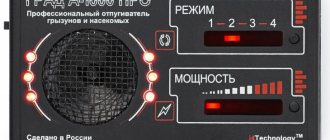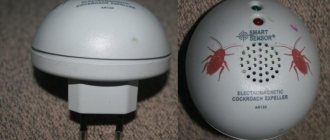Next you will learn:
- Are ultrasonic mole repellers really effective in practice, or is this just another advertising gimmick?
- Do moles even hear ultrasound and is it so important when fighting these animals?
- What mole repellers are mistakenly called ultrasonic;
- How to choose a truly effective device;
- What devices are available for sale and what you should look for when choosing one or another option;
- And also is it possible to make an ultrasonic repeller with your own hands and is it worth making it at all...
Ultrasonic repellers have now become quite a popular means of combating moles on the site (and rodents indoors). And let’s be honest, this popularity is largely due to advertising: manufacturers and sellers of such devices vying with each other about the incredible effectiveness of ultrasonic repellers, and that, they say, using the device does not require any effort on the part of the gardener: just stick it in the ground, turn it on - and The moles are already leaving the area in panic.
Meanwhile, reviews from gardeners and the actual practice of using ultrasonic mole repellers are not always so rosy:
- some repellers work really well for many seasons in a row, and some have no effect at all;
- sometimes the device first scares away moles, and then for some reason its effectiveness begins to decline;
- sometimes the same model can give a good result, but in another area it can be useless.
Why is this happening? And how to choose a truly reliable and effective device among commercially available ultrasonic mole repellers? Let's find out...
Review:
“I installed the repeller on the site in August, when it became completely unbearable. The mole constantly dug the garden, uprooted several bushes of German tomatoes, beat up potatoes, and then the carrots began to grow, I was afraid for them. In general, I spent some money, bought an ultrasonic repeller on a post, Tornado, and stuck it right in the middle of the carrot bed. And lo and behold, it works! There were no new heaps until the end of autumn; we dug up both potatoes and carrots safely. Then they dug up the area with snow, but there wasn’t much of it, and immediately after that it was covered. I left the repeller for the winter and changed the batteries in it.
But now the snow has melted - there are fresh piles in the garden. So I think it makes sense to buy a new device for the spring, or not? The old one died in winter.”
Pavel, St. Petersburg
How do moles hear and do they detect ultrasound?
It is well known that moles have poor vision (many even believe that these animals are completely blind, but this is not so). At the same time, despite the absence of clearly defined ears, moles are fine with hearing - they have it, and they perceive sounds perfectly. For example, moles can hear well how people walk on the surface of the earth, and also make sounds themselves when communicating in burrows.
Moreover, moles have finer hearing than humans, and they can clearly hear air vibrations in the sound range inaccessible to human perception: both ultrasound (with a frequency above 20,000 Hz) and infrasound (with a frequency below 15 Hz).
Moles also sense soil vibration well. There are cases when these animals sensed the approach of earthquakes long before the tremors became noticeable to people.
Review
“Our moles left the site when my husband put the sprinkler on the hose. I think the moles didn’t like this, since the sprayer constantly vibrates when it turns due to the pressure of the water. I don’t even know how to explain it any other way. They dug all spring, destroyed half of the seedlings, and in June, when it got hot and we started watering, everything stopped. The piles of them were leveled, but new ones have not appeared until now.”
Alena, Kaluga
Thus, with the help of sounds, moles can really be scared away: if the sound is strong enough to create discomfort for the animal, then, most likely, the mole will try to leave the area, moving away from the source of discomfort. Moreover, it is not so important whether it is ordinary sound or ultrasound. The only difference is that a person will hear a normal sound, while ultrasound will practically not disturb a person’s rest at his favorite dacha, and, in extreme cases, will be perceived only as a faintly audible squeak.
Now let's see if ultrasonic repellers, which can be bought today in stores or online, will help you achieve the desired result.
Physical destruction measures
Flooding holes with water
Flooding a mole hole with water is a very popular and simple method of pest control. In this case, you need to insert the hose directly into the hole and fill it to the very edges. However, the effectiveness of this method is highly questionable, since the animal will quickly leave the flooded home and start digging a new one. As a result, such burrows can form throughout the entire territory of a summer cottage.
With a shovel
This old folk method of mole hunting is as follows:
- in small steps you should move along the groove of the mole tunnel, while pressing down the soil with grass and leveling the ground;
- with a shovel and hammer, position yourself as close as possible to the location of the animal - it can be easily identified by its fresh furrows;
- if you notice an extension of previously made furrows or the appearance of new ones, you should quietly get up and with a sharp movement stick a shovel behind the area where the mole can presumably operate - this action will block its path;
- the second shovel must be stuck in the same way at the end of the mole's passage - if the animal does not fall under the shovel, destroy it by hitting it with a hammer.
Are ultrasonic repellers effective against moles?
Powerful (and, as a result, quite expensive) ultrasonic repellers powered from an outlet work well against moles. The directional pattern of their emitters is close to circular, and the automation periodically changes frequencies, reducing the effect of animals becoming accustomed to the sound.
However, usually such devices are not used to fight moles, but primarily to scare away rats, mice and other rodents from the house, from a warehouse or from a garden plot - this is exactly how these repellers are positioned.
There is an opinion that the emitter must be buried in the ground in order to effectively influence moles. However, even ultrasound simply emitted into open space penetrates to a certain depth and into the soil - wormholes emerging on the surface of the earth play the role of a kind of sound guide. Therefore, an ultrasonic repeller of sufficient power will create discomfort for moles.
Such repellers include, for example, Chiston-2 and Chiston-4 (Bioguard). They are used mainly in food industry enterprises to protect warehouses and workshops from rodents.
Ultrasonic mole repellers in the form of columns are more common and actively advertised. The relatively low power of these devices is compensated by the fact that they are buried directly in the ground, as a result of which the “unproductive” losses of ultrasound are reduced.
Some of these repellers really help fight moles, while others turn out to be completely useless, and, as practice shows, the same models can be effective in some cases, but have no effect in others.
In addition, you need to keep in mind:
- some of the cheapest Chinese models have such low power that they are not able to repel even mosquitoes, not to mention moles;
- some “ultrasonic” repellers simply squeak quietly in the frequency range well below 20,000 Hz - there is no talk of any ultrasound;
- some models become unusable after the first rain;
- Some solar-powered models only create the appearance of an autonomous, efficient device - the charge is only enough for an hour and a half of barely noticeable work (at the same time, there are really good solar-powered models that can work reliably all night).
It’s also useful to read: How to make a mole trap from plastic bottles with your own hands
Review
“Tell me where in St. Petersburg I can buy a normal ultrasonic mole repeller. I bought two different posts, one supposedly German, and stuck it straight into piles of earth, and it was of no use. The mole even knocked down one such post; apparently, it was digging right under it. Either the mole is so tough, or I just bought rubbish. It doesn’t even matter what the price is, the main thing is that it works...”
Evgeniy, Gatchina
It is also important to understand that the effectiveness of a repeller is not always determined only by the characteristics of the device itself. For example, even high-quality and expensive products that emit ultrasound, audible sounds, and also create mechanical vibration, in some cases do not give long-term results: it is believed that animals simply get used to noise.
For example, it is known that sometimes pests leave an area if a lawn mower or walk-behind tractor is regularly used on it. And in other cases, the mole’s area may be close to a busy road, and the animal will be quite adapted to the constant noise and rumble, so that the “childish” squeak of the repeller will not make any impression on it at all.
We draw intermediate conclusions:
- today you can buy really high-quality ultrasonic repellers that will protect your area from moles from season to season;
- at the same time, the market is full of outright Chinese junk, the use of which initially dooms the summer resident to failure in his fight against moles;
- and finally, even the most advanced electronic mole repellers sometimes do not produce results. And the point here is often not in the device, but in the moles on a specific piece of land. Practice is the criterion of truth, so if possible, it is always better to buy at least one device and test it in practice than to guess.
Brief overview of popular models
| Model | Operating parameters, features |
| Tornado | Powered by rechargeable batteries, generates frequencies up to 400 Hz, changing every 30 seconds. Coverage area – up to 1000 m2. Operating temperature range – from 0 to +50°C. |
| Antikrot | Powered by conventional or solar batteries and does not require additional charging. Maintains performance in sunny and cloudy weather. |
| EcoSniper | Generates powerful wave broadband vibrations, perceived by animals as a seismic alarm. Coverage area – up to 1500 m2. Frequency range – from 300 to 400 Hz. Compact, easy to install. |
| Thunder Pro | It has a built-in vibration motor that increases the power of the sound emitter (speaker) by at least 25%. Powered by 4 batteries, which are enough for 6 months of continuous operation. The case is made of durable stainless aluminum and is moisture resistant and not susceptible to damage. |
| Pest Reppeler | Generates powerful electrosonic vibrations with a frequency of 400-1000 Hz, producing a sound signal every 30 seconds. Designed for large areas, it works around the clock, recharging during the day with a solar battery. Compact, weighs 240 g. |
Repellers and terminology errors
Many gardeners and even store sellers do not distinguish between different types of electric mole repellers, and call all devices that make the slightest squeak or even just vibrate ultrasonic.
Meanwhile, as noted above, ultrasound is only sound in the frequency range above 20,000 Hz, and most people simply will not hear it. Therefore, it is not correct to call a device that monotonously irritates the gardener with a loud squeak, or constantly rumbles, vibrates or rings, an ultrasonic repeller.
On a note
Some mole repellers can operate in different modes, changing them periodically: in ultrasonic mode, in audible sound mode and in vibration mode.
However, we will not delve into the intricacies of the physics of sound, and therefore further we will consider not only the ultrasonic devices themselves, but also those that are called ultrasonic repellers by mistake.
Review
“... It was funny today when a young guy in a store sold me an ultrasonic repeller Grad A500. Especially to demonstrate the full power of ultrasound, he turned it on and said again - look, you hear how powerful ultrasound is. I say - I hear it squeaking, but where is the ultrasound? The instructions say that the repeller emits both simple squeaks and ultrasonic ones, but the sellers, apparently, have no time to read the instructions, and school physics lessons somehow passed them by. So now they let customers listen to ultrasound. Well, it doesn’t matter, now I’ll see how all this will scare the moles in the country.”
Alexander A., Pskov
Another common mistake is trying to look for ultrasonic traps (mole traps). The fact is that it is, in principle, impossible to attract or catch moles using ultrasound. So you won’t find an “ultrasonic mole trap” on sale. Well, perhaps in some fantastic store where they also sell ultrasonic fishing rods or ultrasonic bear traps...
Bioguard repeller: can it be used against moles?
Generally speaking, the Chiston-4 repeller (Bioguard) is positioned as an ultrasonic rodent repeller and is intended for indoor use. The area claimed by the manufacturer to effectively repel rodents is 850 square meters. The manufacturer also claims a circular radiation pattern close to 360° (according to the results of experiments, it was approximately 300°, which, however, is also quite good).
What about moles - will the Bioguard keep them away? Here it is necessary to take into account the significant inconvenience that it is necessary to connect the device to an outlet (it consumes 25 W), and you will also need to protect it from rain. When working under a canopy, you can quite count on repelling moles, but only if the plot of land is small.
Result:
- Bioguard is quite expensive (its price is about 3,500 rubles);
- The device requires connection to an outlet, which is inconvenient when fighting moles on the site.
Thus, the Bioguard ultrasonic rodent repeller will not be the best choice if you are going to repel moles from your area.
The same applies to ultrasonic partings Chiston-2 and Chiston-2 Pro.
Review
“Chiston helped us twice. The first time they took mice out of the attic, they got into the bedroom when they ran away from him. The cat caught them here. And then they turned it on in the garden when the mole started up. There's a problem - he needs an outlet. I had to pull three extension cords. But they made it, they delivered. First, the mole went to the far fence, and then completely disappeared from the garden...”
Tatyana, from correspondence on the forum
The Chiston series devices are, so to speak, truly ultrasonic, that is, they emit ultrasonic vibrations. Such devices also include:
- Ultrasonic repeller of rats, mice, moles, birds and other animals Grad A500;
- Ultrasonic Tornado repeller.
And some others.
However, there is often no point in chasing a powerful ultrasonic device that is inconvenient for use on an open plot of land, because there are specialized mole repellers on sale, sometimes incorrectly also called ultrasonic, but having nothing to do with ultrasound. Let's talk about them...
Sound and vibrating mole repellers
These devices work on the principle of repelling moles with periodically emitted sounds and vibrations. When a device suddenly appears in the garden, stuck into the ground, which periodically beeps, hums and vibrates, moles often really sharply reduce their activity in the area, and sometimes even leave it for the entire season.
It is also useful to read: Using a mole net and reviews about this method of protecting a site
In this case, those repellers that:
- They do not squeak monotonously, but make sounds periodically;
- They alternate sounds of different frequencies in a random mode so that the mole cannot get used to them and perceives them as an unfamiliar dangerous noise;
- They combine sound effects with mechanical vibration transmitted to the ground.
There are several devices that meet these requirements on sale - for example, Ecosniper LS-997M (Molechaser LS 997 Motor), Molechaser LS 997 Motor Random, Weitech 0675, Grom-Profi LED, Skat 49, etc.
On a note
Interestingly, the same Skat 49 is positioned not only as a repeller of moles and mice, but also as a repellent for snakes.
Repellers that generate only intermittent sounds or vibration are less effective. For example, devices from the Antikrot series in the form of small columns, powered by AA batteries or a solar battery.
Important advantages of sound and vibrating repellers:
- These are highly specialized devices designed to repel moles;
- As a rule, the price of such devices is significantly lower than that of powerful ultrasonic rodent repellers;
- Specialized mole repellers are autonomous - they work either from batteries or from sunlight;
- And, finally, they do not spoil the appearance of the area, which cannot be said, for example, about various homemade mole repellers made with your own hands from beer cans or plastic bottles.
However, we should not forget that the effectiveness of even the best repellers is not absolute. Often they really help, and the moles leave the area literally within 24 hours after installing the device. But there are cases when animals do not pay attention to such devices at all and can calmly continue their activities directly under the installed “column”. Let us repeat: in many respects this depends not only on the repeller, but also on how exactly a particular mole will react to extraneous noise (in any population of mammals there are shy and not so shy representatives).
However, if you follow a few simple recommendations, you can increase the likelihood that even a relatively inexpensive repeller will work against moles:
- It is advisable to buy the same device that your neighbors in their summer cottage used and which helped them (it is possible that moles from a neighboring plot moved to yours);
- Products produced in European countries and Russia are preferable to Chinese products;
- When purchasing, it is useful to evaluate the build quality of the device - tightness (the device will have to get wet in the rain many times), absence of microcracks, smoothness of the thread if there is a screw-on lid;
- It is highly desirable for the device to have various operating modes, including a random mode (generating sounds of random frequency and duration);
- It can be useful to periodically change the location of the device on the site.
And, of course, each mole repeller must be used in accordance with the instructions (so that it does not happen that the post, instead of being buried in the ground, is suspended from a tree branch on a rope).
On a note
Remember also that many mole repellers cannot be repaired. This is especially true for Chinese devices. Therefore, they need to be handled quite carefully and should not be driven into the ground with a metal hammer.
Ecosniper LS-997 MR (Motor Random) - an example of a non-ultrasonic mole repeller
The Ecosniper LS-997 MR mole repeller is characterized by the fact that it generates sound pulses in a wide frequency range, with different durations and after different time intervals. Duration of sound pulses: from 1.5 to 3.5 seconds, frequency – from 15 to 75 seconds.
In addition, the device contains a small motor with a pendulum weight, which periodically produces mechanical vibration, which is transmitted through the walls of the repeller into the soil.
The range of the device declared by the manufacturer is 45 meters (but here you should immediately take into account that in the presence of foundations and other underground structures, the effective range will be noticeably lower).
Rules for using devices
Antikrot devices are effective only in a limited area. The propagation of ultrasonic waves is influenced by the structure of the soil. The denser the soil, the better it conducts vibrations.
The quality of operation of the device is affected by the presence on site:
- wells;
- wells;
- foundations;
- concrete barriers;
- cellars, etc.
The required number of devices and their location in the garden should be calculated taking into account obstacles that can interfere with the acoustic effect.
Some models are resistant to moisture and can remain at the installation site for a long time, while others fail even after light rain, so they are installed only during periods favorable for the operation of the device.
To achieve the effect, you need to take into account the manufacturer’s tips and recommendations for installing the device.
Mechanical repellers are mounted inside the wormhole. Electronic devices can be located above the ground or installed in the surface layer of soil.
The device is stuck into the ground.
Is it possible to make such a device with your own hands?
When looking at the prices of high-quality mole repellers (we are not talking about Chinese ineffective consumer goods), many gardeners think about how to make such a repeller with their own hands and thereby save money.
However, in practice, without special knowledge, such an approach will be ineffective, even if there is an electrical circuit of the device. Modern mole repellers include:
- A special microcircuit responsible for changing the frequencies of the generated sound;
- Additional elements that enhance sound;
- Ultrasonic systems use piezo actuators adapted for such devices;
- The device may also contain an electric motor (to create vibration) and an electrical control system for its operation.
It is difficult to buy, assemble and correctly arrange the corresponding electronic components manually, and their cost and the price of the time spent on this will be incomparably greater than the cost of commercially available devices.
However, some craftsmen got rid of moles using a simpler homemade device: an ordinary continuously beeping Chinese electronic alarm clock was placed in a metal pipe. The pipe was buried in the ground and did a fairly good job of scaring away moles;
Review
“I tried to buy a mole repeller in Moscow, I was horrified by the prices. 1500 rubles to drive out the mole, well, no thanks. This is completely beyond the bounds. There's not much stuff there, a speaker, a relay and a small circuit. I found such a circuit on the Internet, screwed the speaker in larger, and powered it from the battery. I installed it in the winter, it’s already April, there are no moles yet. I think it will work."
Pavel, Podolsk
Well, in conclusion, let's summarize:
- There is no point in chasing ultrasonic mole repellers - they are more suitable for fighting rats and mice indoors;
- Autonomous devices that periodically generate sounds of varying frequencies and mechanical vibration are more convenient to use and in many cases are quite effective (although not always);
- If some device helped your neighbor behind the fence, then try using the same one.
If you have personal experience of getting rid of moles using ultrasonic or other repellers, be sure to leave your review at the bottom of this page (in the comments field) - perhaps this will help someone decide on the choice of device.











